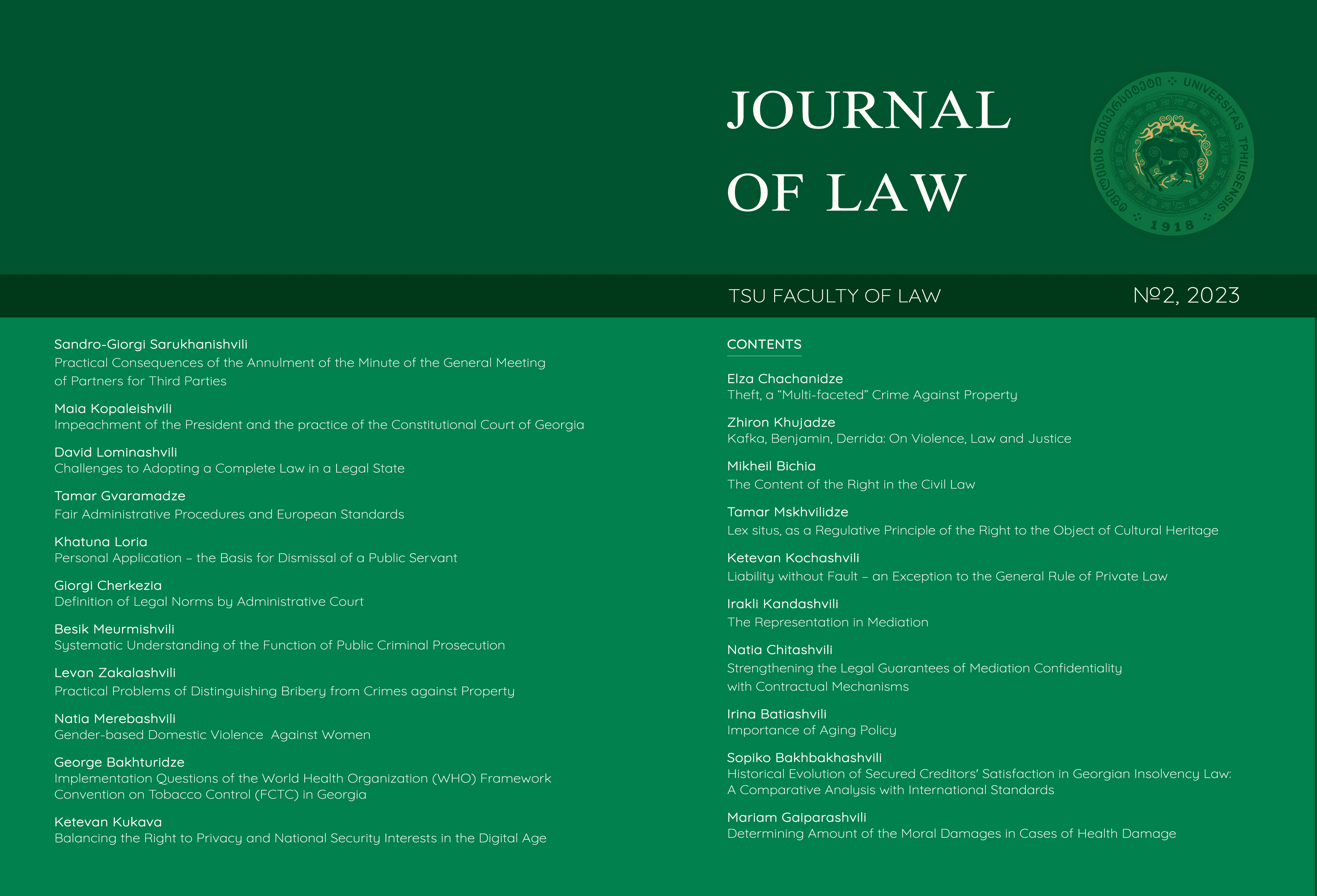Practical Problems of Distinguishing Bribery from Crimes against Property
DOI:
https://doi.org/10.60131/jlaw.2.2023.7708Keywords:
Corruption, Bribery, Crime Against Property, Use of Official Position, Qualification.Abstract
The fight against corruption is a global and one of the most pressing problems for countries. Bribery is the most serious corruption crime according to Georgian criminal law. However, corruption, in addition to bribery, can be committed by using the official position, involving crimes against property, such as “misappropriation or embezzlement” and “fraud”. In Georgian judicial practice, it is often problematic to distinguish bribery from the mentioned crimes against property. This article is dedicated to demonstrating the significant gaps in the decisions of judicial and investigative bodies in this regard. It proposes ways to solve the problem of differentiating these crimes from each other, ensuring accurate legal classification of the act.
References
Law of Georgia “On the Fight against Corruption”, Legislative Herald of Georgia, 17/10/1997.
Criminal Code of Georgia, Legislative Herald of Georgia,, 22/07/1999.
Decree N550 of the President of Georgia "On Approval of the National Anti-Corruption Strategy of Georgia", 24/06/2005, (repealed - 04/06/2010).
Association Agreement between the European Union and Georgia, 30/08/2014
European Convention for the Protection of Human Rights and Fundamental Freedoms, Rome, 1950.
Criminal Law Convention on Corruption (Council Of Europe; Strasbourg, 1999)
United Nations Convention Against Corruption (New York, 2003).
Gray C.W., Kaufmann D., Corruption and Development, Finance & Development / March 1998, 7.
Intskirveli G., General Theory of State and Law, Tbilisi University Publishing House, Vol. 2003, 171 (in Georgian).
Khubua G., Theory of Law, Meridiana Publishing House, Tbilisi, 2004, 153 (in Georgian).
Lekveishvili M., Todua N., Mamulashvili G., Private part of criminal law, book I, ed. "Meridian", Tbilisi, 2019, 521 (in Georgian).
Lekveishvili M., Todua N., Mamulashvili G., Private part of criminal law, book II, Tbilisi, 2020, 390 (in Georgian).
Nachkebia G., The general theory of qualifying an action as a crime, ed. "Innovation", Tbilisi, 2010, 11-14 (in Georgian).
Schroth P. W., Corruption and Accountability of the Civil Service in the United States. The American Journal of Comparative Law, vol. 54, 2006, 553–579.
Tsulaya Z., Private part of criminal law. (Volume II) Ed. "Intelligence", Tbilisi, 2001, 90-91 (in Georgian).
Häberle, P., Grundrechtsgeltung und Grundrechtsinterpretation im Vefassungsstaat Zugleich zur Rechtsvergleichung als "fünfter" Auslegungsmethod, in.: Juristische Zeitschrift, 1989.
Lackner/Kühl, Strafgesetzbuch: StGB Kommentar, 29. Aufl. 2018, § 246, Rn. 1-15.
Verdict №1/3631-22 of July 11, 2022 of the Criminal Affairs Board of Tbilisi City Court's.
Verdict of the Supreme Court of Georgia on February 10, 2020 in case №57აპ.-1919;
Verdict № 1-387-19 of September 2, 2019 of Rustavi City Court.
Verdict № 1/4929-16 of February 16, 2017 of the Criminal Affairs Board of Tbilisi City Court.
http://www.nplg.gov.ge/gwdict/index.php?a=term&d=5&t=3657 [14.03.2023].
https://www.unodc.org/documents/treaties/UNCAC/Publications/Convention/08-50026_E.pdf [15.03.2023].
https://www.imf.org/external/pubs/ft/fandd/1998/03/pdf/gray.pdf - [16/03/2023].
https://csogeorgia.org/ge/newsPost/27763 - [17.03.2023].
Downloads
Published
How to Cite
Issue
Section
License

This work is licensed under a Creative Commons Attribution-ShareAlike 4.0 International License.









